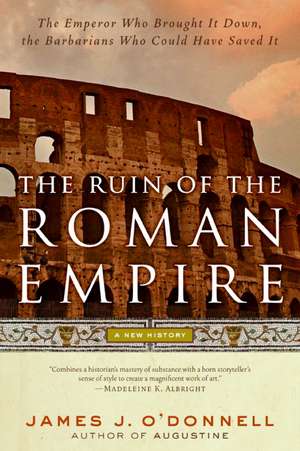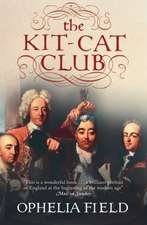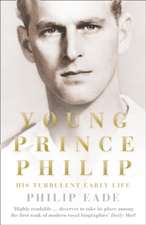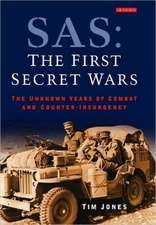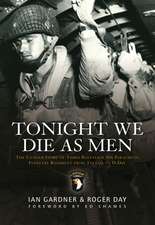The Ruin of the Roman Empire: A New History
Autor James J. O'Donnellen Limba Engleză Paperback – 24 aug 2009
The dream Alexander the Great and Julius Caesar shared of uniting Europe, the Medi-terranean, and the Middle East in a single community shuddered and then collapsed in the wars and disasters of the sixth century. Historian and classicist James J. O'Donnell—who last brought readers his masterful, disturbing, and revelatory biography of Saint Augustine—revisits this old story in a fresh way, bringing home its sometimes painful relevance to today's issues.
With unexpected detail and in his hauntingly vivid style, O'Donnell begins at a time of apparent Roman revival and brings readers to the moment of imminent collapse that just preceded the rise of Islam. Illegal migrations of peoples, religious wars, global pandemics, and the temptations of empire: Rome's end foreshadows today's crises and offers hints how to navigate them—if present leaders will heed this story.
Preț: 113.07 lei
Nou
Puncte Express: 170
Preț estimativ în valută:
21.64€ • 22.65$ • 17.90£
21.64€ • 22.65$ • 17.90£
Carte disponibilă
Livrare economică 15-29 martie
Preluare comenzi: 021 569.72.76
Specificații
ISBN-13: 9780060787417
ISBN-10: 0060787414
Pagini: 448
Dimensiuni: 152 x 229 x 28 mm
Greutate: 0.49 kg
Editura: HarperCollins Publishers
Colecția Ecco
ISBN-10: 0060787414
Pagini: 448
Dimensiuni: 152 x 229 x 28 mm
Greutate: 0.49 kg
Editura: HarperCollins Publishers
Colecția Ecco
Textul de pe ultima copertă
The dream Alexander the Great and Julius Caesar shared of uniting Europe, the Medi-terranean, and the Middle East in a single community shuddered and then collapsed in the wars and disasters of the sixth century. Historian and classicist James J. O'Donnell—who last brought readers his masterful, disturbing, and revelatory biography of Saint Augustine—revisits this old story in a fresh way, bringing home its sometimes painful relevance to today's issues.
With unexpected detail and in his hauntingly vivid style, O'Donnell begins at a time of apparent Roman revival and brings readers to the moment of imminent collapse that just preceded the rise of Islam. Illegal migrations of peoples, religious wars, global pandemics, and the temptations of empire: Rome's end foreshadows today's crises and offers hints how to navigate them—if present leaders will heed this story.
With unexpected detail and in his hauntingly vivid style, O'Donnell begins at a time of apparent Roman revival and brings readers to the moment of imminent collapse that just preceded the rise of Islam. Illegal migrations of peoples, religious wars, global pandemics, and the temptations of empire: Rome's end foreshadows today's crises and offers hints how to navigate them—if present leaders will heed this story.
Recenzii
“O’Donnell’s richly layered book provides significant glimpses into the many factors that leveled a mighty empire.” — Publishers Weekly
“A vigorous history of the decline and fall of the Roman Empire.” — Kirkus Reviews
“Poetic, haunting and humane: a learned and often visceral account of how the Mediterranean ceased to be Roman which serves simultaneously as charge-sheet and lament.” — Tom Holland, author of Rubicon
“James O’Donnell’s The Ruin of the Roman Empire: A New History takes as its centrepiece the period of Ostrogothic rule in sixth-century Italy. . . . [It is] revelatory: scholarly and original, unafraid to tackle profound issues of cultural and religious identity, and often hauntingly poetic.” — Times Literary Supplement (London)
“An exotic and instructive tale, told with life, learning and just the right measure of laughter on every page. O’Donnell combines a historian’s mastery of substance with a born storyteller’s sense of style to create a magnificent work of art. Perfect for history-lovers and admirers of great writing alike.” — Madeleine K. Albright, former U.S. Secretary of State
“A vigorous history of the decline and fall of the Roman Empire.” — Kirkus Reviews
“Poetic, haunting and humane: a learned and often visceral account of how the Mediterranean ceased to be Roman which serves simultaneously as charge-sheet and lament.” — Tom Holland, author of Rubicon
“James O’Donnell’s The Ruin of the Roman Empire: A New History takes as its centrepiece the period of Ostrogothic rule in sixth-century Italy. . . . [It is] revelatory: scholarly and original, unafraid to tackle profound issues of cultural and religious identity, and often hauntingly poetic.” — Times Literary Supplement (London)
“An exotic and instructive tale, told with life, learning and just the right measure of laughter on every page. O’Donnell combines a historian’s mastery of substance with a born storyteller’s sense of style to create a magnificent work of art. Perfect for history-lovers and admirers of great writing alike.” — Madeleine K. Albright, former U.S. Secretary of State
Notă biografică
James J. O'donnell is a classicist who served for ten years as Provost of Georgetown University and is now University Librarian at Arizona State University. He is the author of several books including Augustine, The Ruin of the Roman Empire, and Avatars of the Word. He is the former president of the American Philological Association, a Fellow of the Medieval Academy of America, and the chair of the Board of Directors of the American Council of Learned Societies. He is seen here at an ancient monastery on the eastern frontier of the Roman Empire, in Syria.
